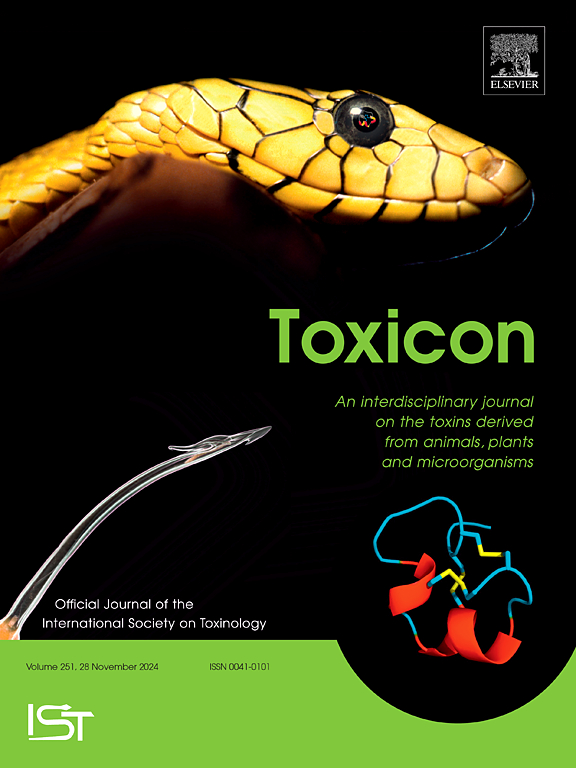Training and educational needs for paediatric snakebite management among rural healthcare providers in Sri Lanka
IF 2.6
4区 医学
Q2 PHARMACOLOGY & PHARMACY
引用次数: 0
Abstract
This mixed-method study aimed to explore the educational and training needs of healthcare providers managing paediatric snakebites in regions with high burdens of snakebite envenomation in rural Sri Lanka. The goal was to identify gaps in current training practices and propose strategies to improve the clinical management of paediatric snakebite cases. A focus group discussion (FGD)-based approach was utilized to gather insights from healthcare providers involved in the management of paediatric snakebites. Participants included medical officers working in paediatric wards, paediatric emergency treatment units, paediatric intensive care units, as well as paediatric house officers and relief house officers. Using purposive sampling, participants were recruited from both tertiary referral centers and peripheral hospitals. Data were collected through six semi-structured FGDs, which were audio-recorded and transcribed. Thematic analysis was conducted following Braun and Clarke's six-step framework. The findings revealed significant gaps in knowledge and training related to paediatric snakebite management, particularly in more peripheral rural hospitals. Participants reported a lack of structured training, standardized institutional protocols, and exposure to paediatric-specific guidelines. Inconsistent knowledge among healthcare providers, particularly in peripheral settings, contributed to inappropriate treatments and delayed referrals. Recommendations for addressing these gaps included simulation-based training, mentorship programs, and standardized treatment protocols, particularly for junior doctors in resource-limited areas. The study highlights critical deficiencies in paediatric snakebite management training in rural Sri Lanka. To improve patient outcomes, there is a need for enhanced training programs, including hands-on experience, mentorship, and telemedicine support. Standardized, evidence-based guidelines should be disseminated and integrated into healthcare practices across all levels of the healthcare system.
斯里兰卡农村医疗保健提供者对儿童蛇咬伤管理的培训和教育需求
这项混合方法研究旨在探讨斯里兰卡农村蛇咬伤中毒高负担地区管理儿科蛇咬伤的医疗保健提供者的教育和培训需求。目标是确定当前培训实践中的差距,并提出改进儿科蛇咬伤病例临床管理的策略。采用焦点小组讨论(FGD)为基础的方法,从参与儿童蛇咬伤管理的医疗保健提供者那里收集见解。与会者包括在儿科病房、儿科急诊病房、儿科重症监护病房工作的医务人员,以及儿科病房干事和救济病房干事。采用有目的的抽样,参与者从三级转诊中心和周边医院招募。通过六个半结构化fgd收集数据,录音并转录。主题分析遵循Braun和Clarke的六步框架。调查结果显示,在与儿科蛇咬伤管理相关的知识和培训方面存在重大差距,特别是在较偏远的农村医院。参与者报告缺乏结构化的培训、标准化的机构协议和儿科特定指南。医疗保健提供者之间不一致的知识,特别是在外围环境,导致不适当的治疗和延迟转诊。解决这些差距的建议包括基于模拟的培训、指导计划和标准化治疗方案,特别是针对资源有限地区的初级医生。该研究强调了斯里兰卡农村儿童蛇咬伤管理培训的严重不足。为了改善患者的治疗效果,需要加强培训计划,包括实践经验、指导和远程医疗支持。标准化的、以证据为基础的指南应在各级卫生保健系统中传播并纳入卫生保健实践。
本文章由计算机程序翻译,如有差异,请以英文原文为准。
求助全文
约1分钟内获得全文
求助全文
来源期刊

Toxicon
医学-毒理学
CiteScore
4.80
自引率
10.70%
发文量
358
审稿时长
68 days
期刊介绍:
Toxicon has an open access mirror Toxicon: X, sharing the same aims and scope, editorial team, submission system and rigorous peer review. An introductory offer Toxicon: X - full waiver of the Open Access fee.
Toxicon''s "aims and scope" are to publish:
-articles containing the results of original research on problems related to toxins derived from animals, plants and microorganisms
-papers on novel findings related to the chemical, pharmacological, toxicological, and immunological properties of natural toxins
-molecular biological studies of toxins and other genes from poisonous and venomous organisms that advance understanding of the role or function of toxins
-clinical observations on poisoning and envenoming where a new therapeutic principle has been proposed or a decidedly superior clinical result has been obtained.
-material on the use of toxins as tools in studying biological processes and material on subjects related to venom and antivenom problems.
-articles on the translational application of toxins, for example as drugs and insecticides
-epidemiological studies on envenoming or poisoning, so long as they highlight a previously unrecognised medical problem or provide insight into the prevention or medical treatment of envenoming or poisoning. Retrospective surveys of hospital records, especially those lacking species identification, will not be considered for publication. Properly designed prospective community-based surveys are strongly encouraged.
-articles describing well-known activities of venoms, such as antibacterial, anticancer, and analgesic activities of arachnid venoms, without any attempt to define the mechanism of action or purify the active component, will not be considered for publication in Toxicon.
-review articles on problems related to toxinology.
To encourage the exchange of ideas, sections of the journal may be devoted to Short Communications, Letters to the Editor and activities of the affiliated societies.
 求助内容:
求助内容: 应助结果提醒方式:
应助结果提醒方式:


